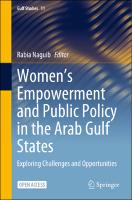Women's Empowerment and Public Policy in the Arab Gulf States
Exploring Challenges and Opportunities
Contributor(s)
Naguib, Rabia (editor)
Language
EnglishAbstract
This open access book explores the various dimensions of women’s empowerment in public policy in the Gulf Cooperation Council (GCC) region, with a particular focus on Qatar, comparing the country to the other Gulf states. Through its rich compilation of empirical qualitative research, the text unpacks the various ways in which women’s empowerment materializes in the GCC context, providing insights into public policy perspectives in high-income rentier states more broadly. The Arab world has long been part of the global dialogue on women’s economic and political empowerment and the GCC has, over the past decade, situated women’s empowerment amongst their respective national priorities and long-term strategies. In turn, the Gulf has seen gradual implementation of policies aimed at women, specifically, in looking to attract and retain them in the labour market, and in the public sector more broadly. The collection surveys and evaluates the progress made in recent decades, paying close attention to the cultural and policy constraints still limiting women’s empowerment in the Gulf. With a key linkage to SDG5, this book is a timely text addressing the context and drivers behind policies centering on women in the Arab region, in its analysis of the interplay of international women’s empowerment discourse and regional public policy decisions. It is relevant to researchers and policy makers focused on women and gender issues in relation to social, cultural, economic, and political empowerment in the Gulf specifically, but also in the Arab world and beyond. ; This open access book explores the various dimensions of women’s empowerment in public policy in the Gulf Cooperation Council (GCC), with a particular focus on Qatar, comparing the country to the other Gulf states. Through its rich compilation of empirical qualitative research, the text unpacks the various ways in which women’s empowerment materializes in the GCC context, providing insights into public policy perspectives in high-income rentier states more broadly. The Arab world has long been part of the global dialogue on women’s economic and political empowerment and the GCC has, over the past decade, situated women’s empowerment amongst their respective national priorities and long-term strategies. In turn, the Gulf has seen gradual implementation of policies aimed at women, specifically, in looking to attract and retain them in the labour market, and in the public sector more broadly. The collection surveys and evaluates the progress made in recent decades, paying close attentionto the cultural and policy constraints still limiting women’s empowerment in the Gulf. With a key linkage to SDG5, this book is a timely text addressing the context and drivers behind policies centering on women in the Arab region, in its analysis of the interplay of international women’s empowerment discourse and regional public policy decisions. It is relevant to researchers and policy makers focused on women and gender issues in relation to social, cultural, economic, and political empowerment in the Gulf specifically, but also in the Arab world and beyond.
Keywords
Public Policy and Women Empowerment in the Gulf; Women and Work in Qatar; Maqasid Approach to Women Empowerment; Public Sector and Empowering Women in Qatar; Public Sector and Empowering Women in the GCC; Family and Labour Economics; Gender, Family and Society; Gender in Law and PolicyDOI
10.1007/978-981-99-6006-4ISBN
9789819960064, 9789819960057, 9789819960064Publisher
Springer NaturePublisher website
https://www.springernature.com/gp/products/booksPublication date and place
Singapore, 2024Imprint
Springer Nature SingaporeSeries
Gulf Studies, 11Classification
Gender studies, gender groups
Public administration
Sociology: family and relationships
Employment and labour law: general
Social law and Medical law
Labour / income economics


 Download
Download Web Shop
Web Shop